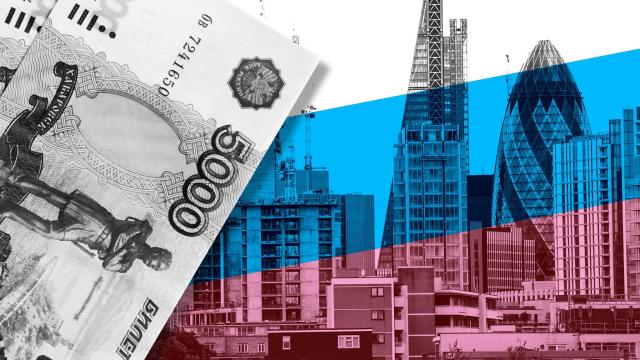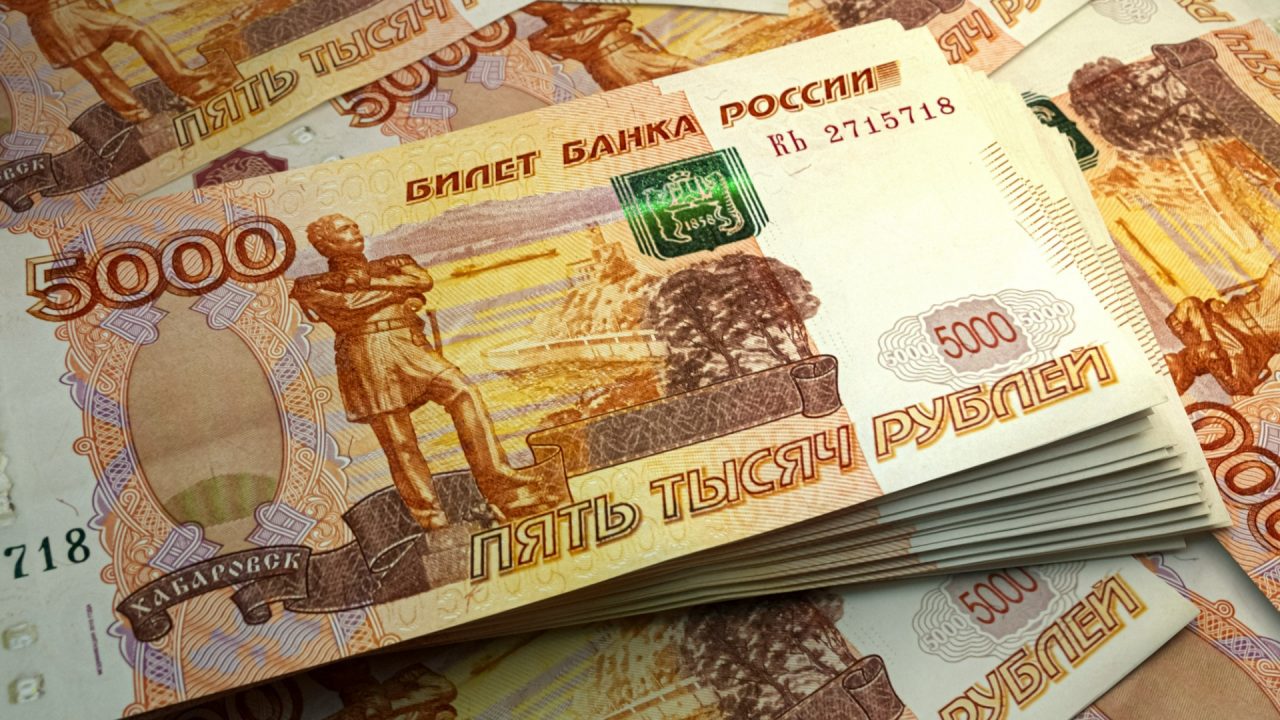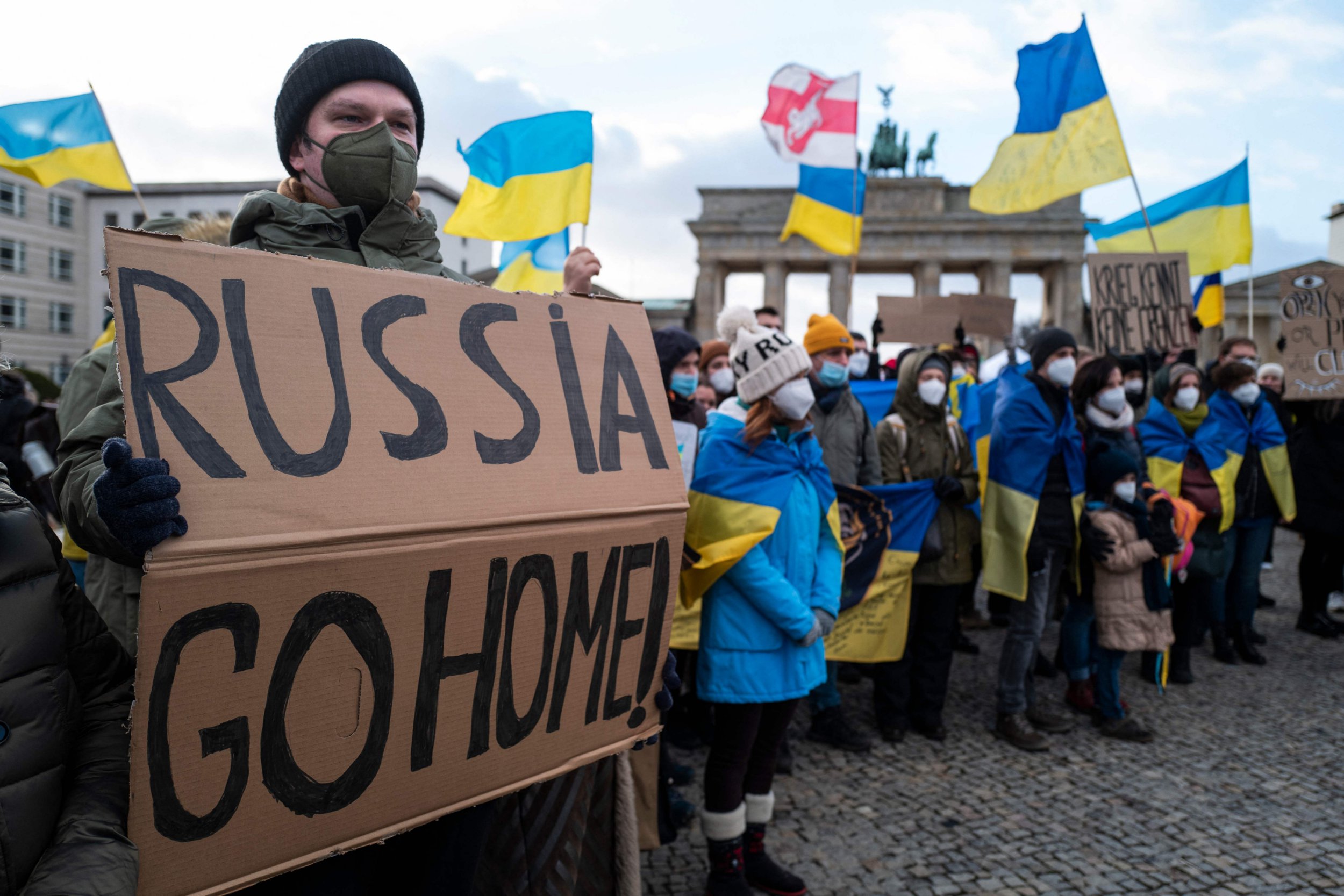
Londongrad, Moscow-on-Thames, butler to the Kremlin’s cronies – they’re all well-warranted nicknames that describe the British capital as a well-run magnet for sheltering Russian money.
But how Londongrad’s fortunes have literally changed overnight. The lavish private residences owned by oligarchs in the capital are now occupied by protestors, with Ukrainian flags unfurled from ornate balconies alongside banners declaring that the properties have been “liberated” and are ready to house refugees.
As the level of destruction worsens in Ukraine following sustained attacks by Russian forces, the West has frantically moved to sanction wealthy oligarchs in a bid to counter Putin’s aggression. Now, as the global go-to venue for foreign capital-raising by Russians, attention has been cast on London and its 30-year history of harboring such obscene fortunes.
Lately, discussion has surfaced around the rise of Londongrad, with many commentators talking of its fall. However, as legislation designed to thwart the flow of dirty money to London remains laced in ambiguity, and filled with holes, it could be argued that the era of Russian fortunes in Britain is far from over.
Britain’s popularity as a destination for wealthy Russian fugitives – including political exiles and refugees – dates back to the 19th century. But Londongrad’s roots were largely laid in the early 1990s with the fall of the Soviet Union.
The dissolution of the Soviet Union in 1991 encouraged oligarchs to move their wealth out of the country. Many looked west, to the financial capital of the world, London.
Tom Keatinge, director of the Centre for Financial Crime and Security Studies at the think-tank Royal United Services Institute, explained that London attracted such individuals because of its attractive visa scheme, which enabled people to move to the UK relatively easily. This was coupled with the country’s capital market system, which accommodated large investments.
“If you’re going to be investing hundreds of millions, you’re going to be investing in a market that can accommodate that size of investment,” said Keatinge.
In 2003, Roman Abramovich, the billionaire Russian oligarch, bought Chelsea Football Club in trendy southwest London. The club was the businessman’s most famous asset, ahead of his Kensington mansion, super yachts, and 29 percent stake in the steel and mining group Evraz.
The purchase of Chelsea FC not only helped transform the Premier League team into trophy winners, but it became symbolic of Russian money and status in London. For many Britons, Abramovich was the original Russian oligarch.
UK politicians welcomed the oligarchs and their unbridled wealth with open arms. In 2000, then-Prime Minister Tony Blair attended an opera in St. Petersburg as Vladimir Putin’s guest.
The ‘golden visa’
In 2008, life became even easier for obscenely rich Russians to amass in London with the introduction of the Tier 1 (investor) visa, nicknamed the “golden visa,” which offered residency to those investing £2 million or more in the UK. The visa allows the families of investors to join them, and holders can apply for permanent residency in the UK.
In fact, the speed of an application for permanent residency depends on the value of the investment. A £2 million investment, for example, enables an application within five years. Whereas with a £5 million investment, the time scale is shortened to three years, and made shorter still to two years if a £10 million investment is made.
In the wake of Russia’s devastating invasion of Ukraine, and a slate of sanctions imposed on Russia oligarchs with assets in the UK, the “golden visa” route to residency has been closed. In revoking the visa scheme, the UK government said it had “failed to deliver to the UK people [while presenting] opportunities for corrupt elites to access the UK.”
The move is part of a string of measures implemented by the British government aimed at isolating and putting pressure on Russia’s economic elites amid the country’s war of aggression on Ukraine. The action has included UK ministers placing sanctions on a number of Russia oligarchs, including Abramovich, who, according to a government document, has had a “close relationship for decades” with Vladimir Putin.
The sanctioning included freezing the oligarch’s assets and barring him from selling the football club – at least for the time being.
On March 15, the UK government issued a press release announcing a “historic” round of sanctions in which it revealed that the foreign secretary, Liz Truss, had announced an additional 370 sanctions – taking the UK toll of the Russian sanctions regime to more than 1,000 individuals and entities. According to the government, such achievements have been made possible “thanks to new urgent Economic Crime Act powers.”
Economic Crime Bill and its flaws
The Economic Crime (Transparency and Enforcement) Act was hastily introduced following Russia’s invasion of Ukraine. The government claimed the new legislation was needed to discourage the flow of dirty money, especially Russian money entering the UK. The law promised to expose oligarchs to proper scrutiny.
However, there are concerns with the UK government’s alleged crackdown on ill-gotten gains coming into Britain, and fears that the so-called end of the era of Russian money coming to London won’t be actually over.
The legislation modifies sanction regulations, abolishing some of the constrictions that enabled Britain to lag behind its allies when it came to sanctioning the oligarchs. Specifically, the bill imposed transparency on offshore companies that own property in the UK. The measure was considered so urgent it was rushed through parliament in a single day – a process that typically takes months.
In principle, under the plan, an oligarch will no longer be able to own property and assets anonymously in the UK. However, there’s a problem: the bill is riddled with loopholes – “more holes than Swiss cheese” according to some – meaning it’s unlikely to make much of a difference.
A key component of the bill is to generate a new register of foreign entities. The register will require overseas companies that own or buy property in the UK to provide details of their beneficial owners to Companies House, the country’s registrar of companies. An overseas entity will have to be registered with Companies House in order to register title to land.
A “beneficial owner” is a person who holds a 25 percent or more share in a property, has voting rights in the overseas entity, or exercises significant influence over it. Prem Sikka, an Emeritus Professor of Accounting at the University of Essex and the University of Sheffield, and a Labour member of the House of Lords, writes:
“It does not take a genius to concoct arrangements which fail to meet the ‘beneficial owner’ definition and thus avoid identification of the beneficiaries. For example, five people may own 20% each of the overseas entity and none would need to be identified as the beneficial owner. They can also hide behind nominee shareholders and directors, and agents.”
Meanwhile, Scottish National Party MP Alison Thewliss urged ministers to lower the threshold for beneficial ownership for 25 percent to 10 percent. “Evidence already points to the threshold being gamed and to people appointing family members and those they can easily control, and the government need to be aware of that and do more to prevent it,” Thewliss said.
Another major concern with the bill is the time period to declare assets in the UK: it was originally supposed to be 18 months, but Tory ministers cut it to six months and refused to accept Labour’s proposal for a 28-day grace period to declare assets.
The opposition party has been quick to jump, saying six months is too long, providing oligarchs with generous time to sell and invest. As Seema Malhotra, a Labour Member of Parliament, said: “Six months still provides ample time for criminals to sell properties and find other assets in which to invest.”
Author Oliver Bullough, who has been writing about the proliferation of Russian wealth in the UK for years, described claims that the UK is actually rooting out dirty Russian money as “ludicrous.”
At the end of the day, bankers, wealth managers and lawyers in the UK have become so reliant on dirty Russian money that it will take more than an Economic Crime Bill, riddled in loopholes, to cut the channels feeding cash from Moscow to London. In truth, the Londongrad era is far from over.
















